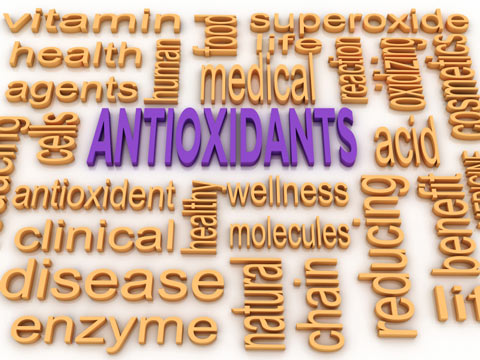Alpha Lipoic Acid is a Natural Energy Rejuvenator and Antioxidant

Although alpha lipoic acid is probably most well-known as an antioxidant, it's also a natural energy booster. The R-form of alpha lipoic acid is produced in all of our cells. In fact, the primary function of alpha lipoic acid is to help the mitochondria in cells make energy from the food we eat. (ii.1, 57)
Alpha Lipoic Acid Effectively Fights Free Radicals
As an antioxidant, alpha lipoic acid is considered more potent than vitamin C and vitamin E. It protects cells from damage by free radicals, which has been linked to many diseases. (ii.1, 57-58)
Alpha lipoic acid is a rare type of antioxidant because it is both water and fat (lipid) soluble. Most antioxidants only dissolve easily in one or the other. For example, vitamin C dissolves in water, while vitamin E is soluble in fats. The ability to penetrate lipid membranes of cells increases alpha lipoic acid's effectiveness throughout the entire body. (ii.1, 57, 59-60)
This is especially useful in the brain. Cells in the brain contain high levels of fatty acids, making them vulnerable to free radical damage. Alpha lipoic acid and its main metabolite, dihydrolipoic acid (DHLA), both cross the blood brain barrier safely and may be useful in protecting brain cells. (ii.1, 57, 59-60)
Although alpha lipoic acid is quickly digested, DHLA is also an antioxidant that quenches free radicals. In fact, studies suggest that DHLA, which is water-soluble, neutralizes the types of free radicals alpha lipoic acid misses. (ii.1, 59, 63)
What Are Free Radicals?
Free radicals are basically reactive, unstable molecules. They contain oxygen atoms with unpaired electrons, which is what makes them unstable. An oxygen atom with an unpaired electron can also be a free radical. Free radicals are naturally produced as byproducts of many processes in the body, including when our cells convert food into energy. (ii.57, 61-62)
Why Are Excess Free Radicals Dangerous?Free radicals steal electrons from other atoms in the body in order to stabilize themselves - a process called oxidation. So when a substance is oxidized, it has an electron stolen from it and becomes a free radical itself. (ii.61-62)
When free radicals steal electrons from proteins and lipids in cells, damaging even a cell's DNA. Excess free radicals create oxidative stress that helps cause disease. (ii.61-62)
How Do Antioxidants Help?Just as we produce free radicals, our bodies also make antioxidants to keep free radicals in check. Antioxidants are molecules that can give up an electron to stabilize free radicals - without turning into free radicals themselves. Many natural herbs and foods also contain antioxidants and the nutrients we need to make our own. (ii.61-62)
Alpha Lipoic Acid Enhances Natural Antioxidant Levels
In addition to its direct antioxidant effects, alpha lipoic acid helps the body recycle and prevent deficiencies in other antioxidants. These include: (ii.1, 57, 64)
DHLA increases the antioxidant strength of coenzyme Q10. CoQ10 is also involved in making cell energy in the mitochondria. (ii.63, 65)
Alpha Lipoic Acid Helps Activate Cell Defenses
Researchers have discovered that alpha lipoic acid activates Nrf2, a type of protein that prompts gene activity. In the presence of oxidative stress or toxins, Nrf2 stimulates protective genes that: (ii.66)

- Produce natural antioxidants.
- Neutralize free radicals.
- Initiate detoxification.
One of the most important Nrf2 defenses is to restore glutathione (GSH) antioxidant levels in organs. GSH is the most abundant antioxidant our bodies produce naturally. Not only is GSH an antioxidant, it helps get rid of toxic substances and protects against disease. (ii.1, 59, 62)
However, levels of GSH decline as we age. Autopsy results of patients who had age-related diseases (such as Alzheimer's and Parkinson's disease) show glutathione deficiencies. (ii.1, 67)
However, most clinical studies suggest taking oral glutathione supplements won't help raise levels of GSH in organs such as the brain since it's completely broken down in the intestines. The good news as that alpha lipoic acid raises GSH levels (and crosses the blood-brain barrier). Studies suggest alpha lipoic acid's activity could help protect against age-related decline in GSH. (ii.1, 58-59, 62)
Alpha Lipoic Acid Boosts Cell Energy
Alpha lipoic acid's detoxifying and antioxidant effects help protect mitochondria. Mitochondria are especially vulnerable to free radical damage. Aging, toxins, and disease can increase levels of free radicals and cause mitochondria to not work properly. At the same time, dysfunctional mitochondria don't produce enough energy and increase levels of free radicals, which contribute to a cycle of further aging and disease. (ii.68-70)
Alpha lipoic acid's cell-rejuvenating powers may stem from the combination of its antioxidant activity and ability to restore mitochondrial function. Animal studies show that dietary alpha lipoic acid helps mitochondria partially or fully recover in heart, liver, muscle, and nerve cells. (ii.68-69)


